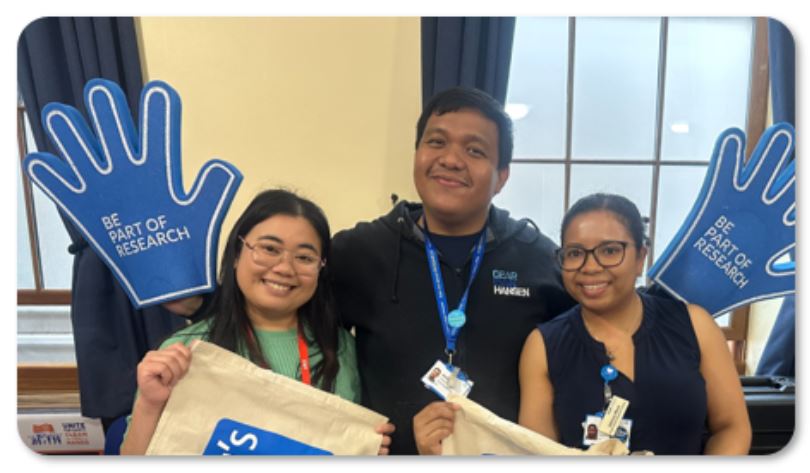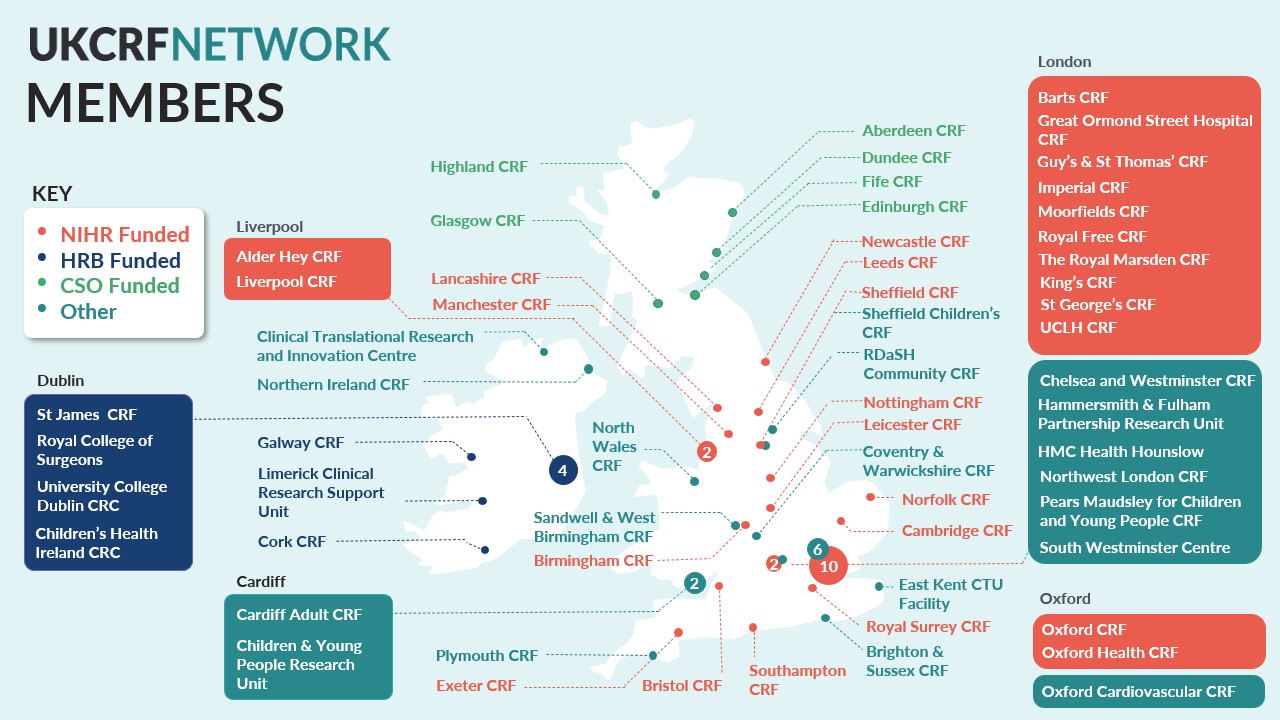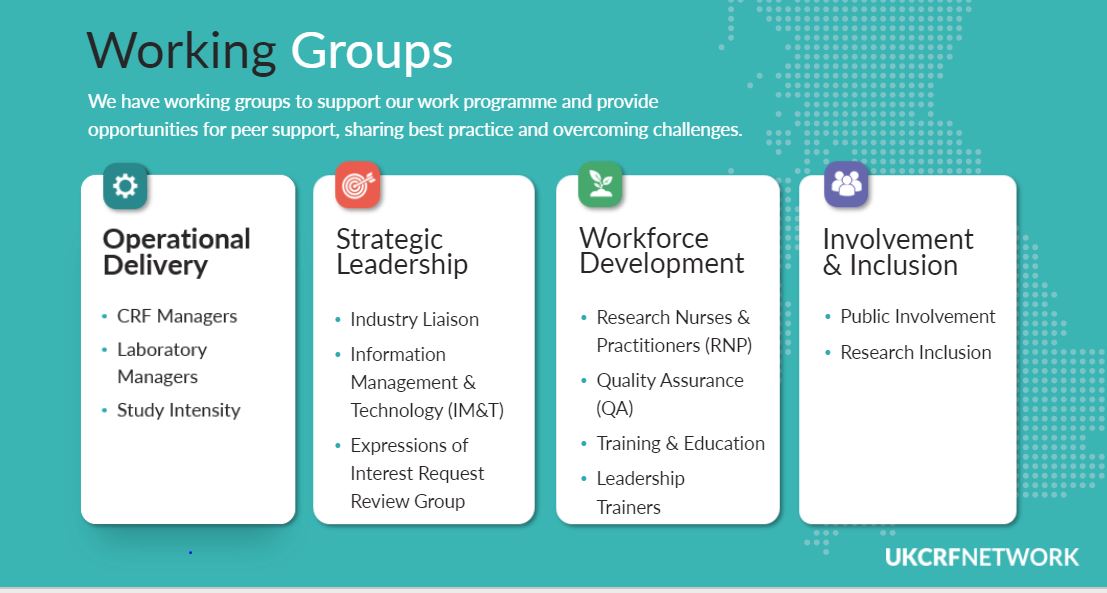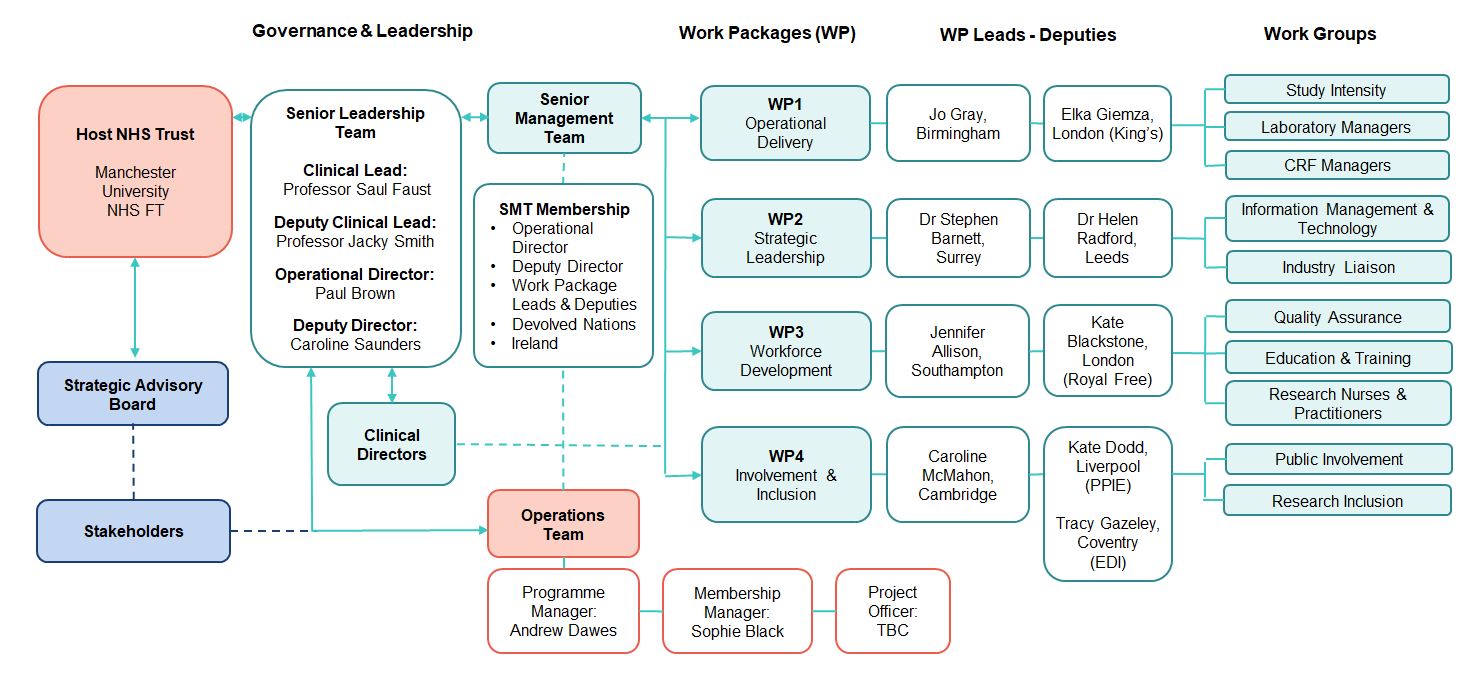
This strategy can also be downloaded as a PDF
Contents
Introduction
The UK Clinical Research Facility (UKCRF) Network collaborates with and provides support for over 50 Clinical Research Facilities (CRFs) across the UK and Ireland to enhance the delivery of early-phase and high-intensity clinical research, and improve standards to benefit patients and the public.
This document details how we plan to achieve and build on our successful track record of supporting CRFs in collaboration and coordination of patient and public involvement, engagement (PPIE) and participation activities. It will explain in detail the UKCRF Network ambition, aims and goals for PPIE for 2023-2025. This strategy is a live document, and it will regularly be revised and updated to reflect our progress and our evolving relationship with our CRF PPIE Leads and public members.
This strategy is developed around the six UK Standards for Public involvement, adapting them to the UKCRF Network priorities.
Acronyms
We have tried to minimise acronyms in this strategy.
The ones we have used can be found below:
- CRF: Clinical Research Facility
- EDI: Equality, diversity and Inclusion
- NIHR: National Institute for Health and Care Research
- PPIE: Patient and Public Involvement and Engagement
- SMT: Senior Management Team
- UKCRF Network: United Kingdom Clinical Research Facility Network
- WP: Work Package
- WTE: Whole Time Equivalent
Definitions
- Clinical Research Facility: purpose-built facilities in NHS hospitals where researchers can deliver studies. These studies may be in an early phase (when a researcher is looking at whether something is safe or effective).
- Clinical Trial: an experiment to compare the effects of two or more medicines, treatments, or procedures. ‘Clinical trial’ is an umbrella term for a variety of different experiments using different methods.
- Collaboration: to work with someone else to produce something.
- Cross cutting: linking the separate work groups and working together
- Equality: ensuring that everyone is given equal access to resources and opportunities to use their skills and talents. Taking a systems approach to what we do and how we do it and identifying and removing long standing, structural barriers to success.
- Diversity: being reflective of the wider community. Having a diverse community, with people from a broad range of backgrounds represented in all areas and at all levels.
- Inclusion: an approach where groups or individuals with different backgrounds are welcomed, culturally and socially accepted, and treated equally. Engaging with each person as an individual. A sense of belonging that is respectful of people for who they are.
- Outward facing: Work Package 4’s work is related to people and their experiences and how we can work together with the other work packages and their work.
- Public members: include patients, potential patients, carers, and people who use health and social care services as well as people from organisations that represent people who use services.
- Stakeholder: a person or people such as an employee or customer who is involved with an organisation, and has responsibilities towards it and an interest in its success.
- Research: discovering new knowledge that could lead to changes in treatments, policies, or care.
What is Patient and Public Involvement, Engagement and Participation?
Throughout this strategy, we describe patient and public involvement, engagement (PPIE) as well as the word ‘participation’ (P) as defined by NIHR (NIHR definitions):
Involvement: Where members of the public are actively involved in research projects and in research organisations and research is carried out ‘with’ or ‘by’ members of the public rather than ‘to’, ‘about’ or ‘for’ them
Engagement: Where information and knowledge about research is provided and disseminated
Participation: Where people take part in a research study
About the UKCRF Network
The UKCRF Network leads the coordination of operational best-practice for both NIHR and non-NIHR Clinical Research Facilities (CRFs) to achieve their goals of benefiting patients and the public across the UK and Ireland. We do this by connecting with each other, sharing expertise, best practice, training and development, and delivering networked experimental medicine and early-phase trials.
Clinical Research Facilities (CRFs) provide:
- Dedicated purpose built, flexible clinical research spaces.
- A highly skilled, agile, and experienced workforce.
Over 50 CRFs with over 110 individual units and over 310 working group members across the UK and Ireland.
Figure 1: Map of all CRFs across UK and Ireland

Our vision is to build on our previous successful track record of delivering our key objectives of building relationships and supporting our CRF communities who all differ in speciality, size, budget, and workforce. Working alongside CRFs, we are constantly learning and evolving from across all aspects of the research community, including understanding the needs of the CRF workforce and public members and how we can support them.
We pride ourselves on being responsive implementing operational changes to support our CRFs in the delivery of experimental medicine and early phase research. To do this we have four Work Packages (WP):
- WP 1: Operational Delivery
- WP 2: Strategic Leadership
- WP 3: Workforce Development
- WP 4: Involvement and Inclusion
Each WP is made up of Working Groups (figure 2), that focus on operational, strategic and workforce needs. WP 4: Involvement and Inclusion, is cross cutting, linking and working together across and with the other Work Packages and Working Groups.
Work Package 4: Involvement and Inclusion
WP 4: Is focused on Public and Patient Involvement, Engagement, and Participation, and Research Inclusion (inclusion; equality, diversity and inclusion-EDI). We believe they sit alongside each other and work together in achieving our goal of promoting effective involvement and inclusion throughout the UKCRF Network whilst acknowledging that they are different. We recognise the close working and common themes of both being ‘outward’ facing [relating to people and their experiences] themes [see the UKCRF Network EDI strategy], but they are independent of each other. Changing our working structure to represent this. The PPIE Working Group is an existing group and welcomes members who are CRF PPIE Leads or those who have PPIE within their role. Work Package 4 will have one Lead, two Deputies (1 x PPIE and 1 x Research Inclusion) who will be members of the UKCRF Network Senior Management Team (SMT).
The UKCRF Network will embed PPIE within the culture and governance structures of the UKCRF Network and improve the patient and public’s voice by creating a steering group. Using real-world voices of people’s life experiences will benefit the UKCRF Network across all WPs.
Examples of planned PPIE activities for the crosscutting themes include:
- WP1: Developing UKCRF Network marketing materials and sharing real case studies.
- WP2: Industry Expression of Interest group for Experimental Medicine Industry studies.
- WP3: PPIE training and development for our CRF workforce.
- WP4: PPIE Research Champions to contribute to WP4 meetings, conference sessions, document/tool development, and sharing of information.
Figure 2: Working Groups

Best Practice
We will provide CRF PPIE Leads support, guidance and training opportunities to carry out their role, sharing best practice and sharing good examples of PPIE practice with others in a variety of ways, we will:
- Culture: Develop a culture that places PPIE at the heart of all aspects of our work.
- Leadership: Provide a forum for CRF PPIE Leads to develop and deliver a program of work that is relevant and proportionate to our CRF community, such as budget constraints, dual roles in CRF workforce and capacity.
- Community: Focus on peer support, training and development, research participant experience and sharing research champion’s stories in a CRF setting to a wider audience e.g. at the UKCRF Network annual conference.
- Working together: Represent CRFs locally and nationally, utilising expertise to pull through learning, guide and align our work to national strategies (Going the Extra Mile and Best Research for Best Health: The Next Chapter ).
- Best practice: Work with leaders in the PPIE field to ensure our program of work complies with national standards for PPIE strategy.
Supporting CRF Workforce
We will undertake baseline surveys of CRF staff to understand the current CRF PPIE priorities, of staff in PPIE roles and staff access to training and development. We will deliver a programme of work that is relevant and proportionate, aiming to address and overcome the challenges many CRFs experience in implementation and delivery of research inclusion initiatives / strategies (dual roles, staff turnover, budget constraints, capacity).
We will build capacity, capability and confidence: Informed by a UKCRF Network Workforce Survey (2022), we will support our PPIE and EDI Leads to work collaboratively and with confidence by providing peer support forums, leadership and skills training, and opportunities for joint working as detailed in our objectives.
We will act on the findings of a UKCRF Network PPIE Priorities Survey completed by CRFs in October 2023.
UKCRF Network PPIE SMART Objectives 2023-2028
Relevant PPIE Standards: Governance; Impact; Inclusive Opportunities; Working Together; Communications; Support and Learning
Expected outcome: Provides a go to place for CRF PPIE Leads to get involved with joint working
We will achieve this through the following actions (click + for more details on each)
a) Provide leadership and support to CRF PPI Leads
Success Criteria:
i. WP4 Lead, Deputy and chair appointed to deliver key UKCRF Network PPIE objectives.
ii. A refreshed PPIE strategy agreed by members of the Senior Management Team, Senior Leadership Team and NIHR.
iii. Delivery of Public Involvement Objectives via regular Working Group meetings both virtually and in person.
b) Provide peer support through Working Group membership
Success Criteria:
iv. NIHR involved in Working Groups.
v. CRF leads are provided with updates on national PPIE initiatives
vi. Membership of and access to WP4 Working Groups are open to all staff and public members working in CRFs with PPIE roles
Timeframe: Medium term (2-3 years)
Success Criteria:
viii. Buddy/mentorship scheme created for CRF PPIE Leads.
c) Provide CRF PPI voice at national forums
Success Criteria:
ix. PPIE representation on Network Strategic Advisory Board, access to Research Champion steering group members to support other Network Work Package projects in place.
2. Working together to align our work as a UKCRF Network, locally and nationally
Relevant PPIE Standards: Working Together
Expected outcome: Provide opportunities for collaborative working that is: inclusive, relevant to CRFs, proportionate to resources, aligned to national PPIE strategy and meets UK PPI standards
We will achieve this through the following actions (click + for more details on each)
a) Share ideas and resources to help support national initiatives
Success Criteria:
i. Survey conducted on CRF PPIE priorities to identify learning needs of CRFs.
b) Identify projects for future programs of work
Success Criteria:
ii. Survey findings actioned and reported at Senior Management Team meetings and via Annual Report to NIHR.
3. Promote and establish an inclusive UKCRF Network community across UK and Ireland
Relevant PPIE Standards: Governance, Impact, Inclusive Opportunities, Working Together, Communications, Support and Learning
Expected outcome: Other Network Work Packages and external partners have access to CRF PPIE Leads and public members to contribute to projects
We will achieve this through the following actions (click + for more details on each)
a) Work together across all Work Packages
Success Criteria:
i) UKCRF Network Marketing Material created with public members available for events and online
ii) Collaboration with Network Research Inclusion Working Group for CRF EDI data collection.
iii) Work with WP1 (via the CRF Managers Working Group), to review barriers to research participation initiated.
vi) Learning outcomes and feedback from UKCRF Network Leadership pilot analysed, recommendations to expand to other CRF staff groups.
Timeframe: Medium term (3-4 years)
Success Criteria:
v) A database of UKCRF Network public contributors willing to get involved in Network projects.
vi) Access to CRF PPIE expertise (staff and public contributors) made available to industry
b) Identify projects to raise research awareness
Success Criteria:
vii). A library of CRF examples to share best practice created and accessible across the Network.
4. Build capacity, capability and confidence in CRF PPIE Leads
Relevant PPIE Standards: Support and Learning, Governance, Impact, Inclusive Opportunities, Working Together, Communications
Expected outcome:
Relevant development and training is available to CRF staff and public contributors
Peer support is provided for CRF PPIE Leads and public contributors
We will achieve this through the following actions (click + for more details on each)
a) Identify learning needs of CRF PPIE workforce and public contributors
Success Criteria:
i) Workforce training needs survey completed, development opportunities for staff and public contributors identified, action plan for delivery from years 2-5 agreed with WP3.
ii) WP4 to work with WP1 to identify barriers to research participation identified and tools developed to address these developed with WP1. Action plan for delivery from years 3-5 agreed.
Working in Partnership
Building relationships with our CRF Research Champions is a priority for the UKCRF Network as PPIE and participation is embedded across the UKCRF Network Work Packages over the next 5 years.
The UKCRF Network, established in 2008, is funded by NIHR, hosted by Manchester University Hospitals NHS Foundation Trust, and works in partnership with the Chief Scientist Office (Scotland), Health and Care Research Wales and Health Research Board (Ireland) to support CRFs to deliver world leading experimental medicine and early phase clinical research.
The Network collaborates with CRFs and other Experimental Medicine infrastructure including:
- National Office for Clinical Research Infrastructure (NOCRI)
- Experimental Cancer Medicine Centres (ECMCs)
- NIHR Biomedical Research Centres (BRCs)
- Translational Research Collaborations (TRCs)
- Advanced Therapy (ATIMP) Accelerators across the UK/Ireland.
CRFs are different in size, scope of operations, funding, location, specialities and workforce. Our WP4 ambition is to support CRFs to deliver equitable, inclusive and diverse research that reduces health inequalities by delivering a programme of work that is relevant and proportionate to our CRF community and which addresses the challenges many experience.
We will work with stakeholders including NIHR CCF PPI team, who provide us with guidance and resources.
Leadership and Governance
The UKCRF Network is led by a Senior Leadership and Management Team, with Work Package Leads and Deputies delivering our work programme, supported by working groups and a central Operations Team. Our leaders are fairly appointed from CRFs across the UK and Ireland utilising our expertise to drive forward actions and coordinate a national early phase research delivery platform as ‘one CRF’.
The UKCRF Network Governance structure (Figure 3): delivery of Work Package objectives is reviewed and monitored at Work Package meetings (~x 3 per year) and UKCRF Network Senior Management Team Meetings (~ x 6 per year). Work Package outputs and impact are reported annually in the UKCRF Network Annual Report to NIHR and at the UKCRF Network annual conference.
Regular updates are provided to the UKCRF Network Senior Leadership Team (Directors, Clinical Leads & Deputies) and to the UKCRF Network Strategic Advisory Board (twice yearly) and to the UKCRF Network Stakeholder Group (as required).
The Public Involvement Work Group, in addition to providing peer support and scoping workforce development, will collaborate with individual CRF PPI Leads and their public members, to support our activities by providing real life experience, ensuring PPI across the UKCRF Network.
Figure 3: UKCRF Network Governance Structure

Monitoring Outcomes
We know that our initial objectives are focused on the short term, however these are laying the foundations and will be built over the 5-year funding cycle. We will:
Review progress-regular meetings: currently monthly for WP 4 leads, every other month at Senior Management Team meeting (see Figure 2 for governance structure), WP 4 will give 3 updates per year against our objectives and add any PPI considerations on the standing agenda items.
Quarterly meetings are planned for the PPI work group with a minimum face to face meeting at the UKCRF Network annual conference.
We are starting this strategy collecting data from our CRF PPI priorities Feedback- from both our CRF members, Senior Management Team and public contributors will all shape our objectives. We will return to these questions, and this will inform us for year 3 of the strategy.
Budget Allocation
To deliver these aims we will fund dedicated roles to oversee the delivery of work programmes, including Lead (0.25 WTE); Deputy x 2 (0.2 WTE) Chair x 2 (0.1 WTE) and CRF link Director. This demonstrates a real step change in resources and opportunity to deliver meaningful PPIE and Research Inclusion.
We will provide funding, in accordance with NIHR Centre for Engagement and Dissemination guidance for public contributors for time spent supporting the UKCRF Network and reimbursement of out of pocket expenses. Our budget for PPIE is ~£5, 000 per annum.
Contacts
To find out more about patient and public involvement at UKCRF Network, please email:
[email protected] or [email protected]



